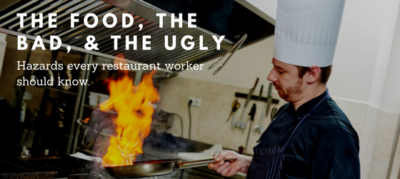When people think of Georgia work injuries, the occupations that usually come to mind are construction, logging and other incredibly strenuous types of work. What many people don’t realize is that the restaurant industry generates an unexpectedly high number of workers’ compensation claims.
According to the National Restaurant Association’s website, there are roughly 14.7 million restaurant employees. That’s almost 10% of the total U.S. workforce. Jobs range from bussers and servers to line cooks and sous chefs, and everything in between. These jobs are often met with high-paced work environments, stressful shifts, and even occupational hazards that are sometimes not easy to spot and sometimes outright ignored. So what are these risks and what are the rights of restaurant employees who are injured? Let’s serve you some information.
A Menu of Hazards
Work hazards come in all forms, some more noticeable than others. While there are obvious dangers such as handling sharp objects or working over open flames, there are also restaurant work injuries that take time set in. For example, something as simple as constantly using a dull cutting knife can lead to muscle stress and injury within the wrists, forearms, shoulders, and upper back. Other underlying injuries that stem from repetition can be due to constant heavy lifting or long periods of uncomfortable standing on hard surfaces, both of which oftentimes leave workers with debilitating back problems later in life.
Strenuous repetition is not the only form restaurant-related injuries take. Many others happen within a blink of an eye, sometimes leaving the employee unable to work for a period of time. These more dramatic injuries can be the result of burns, cuts, slips, and falls. Many restaurant members who work in the kitchen are subjected to meeting their ticket times while working with extremely hazardous objects such as knives. The pressure to prepare and deliver a customer’s food in a timely fashion can lead to injuries ranging from minor cuts to major lacerations. These same factors oftentimes play into burn-related injuries, where a cook may come in contact with hot grease or searing flames that not only inflict intense pain, but also leave lasting scars.
Employees who work at the “front of the house” must be mindful of hazards, as well. While servers and hosts are not working directly with dangerous culinary tools, the constant pressure to be as attentive to each customer brings its own dangers such as slips and spills. Walking across wet floors or wearing improper footwear can leave a worker taking a tumble that may end up causing more than just embarrassment. Lack of housekeeping or employers failing to inform their workers on proper uniforms and guidelines can oftentimes be a recipe for disaster.
The use of chemicals (often times used during routine cleanings) should be handled with care. Proper safety wear should be provided as well as adequate labeling on each product. The mishandling of things such as grease cleaners, especially when placed in contact with open cuts or wounds, can create costly health problems for workers down the road.
So What Are Your Rights?
If you’ve been injured at work, after seeking immediate medical attention and documenting and reporting your injury, the next step should be to contact an attorney. Whether you choose our firm or not, we recommend getting representation from a workers’ compensation attorney with experience in representing injured restaurant workers like we do. An experienced attorney can explain the law as it relates to your specific situations and guide you towards action that could lead to the best possible outcome for you.
You have rights. Many are provided by OSHA (Occupational Safety and Hazard of the U.S. Department of Labor). Remember, employers are responsible for ensuring their employees are able to work in a safe, non-threatening environment.
Employees are also have the right to:
-File a complaint with OSHA if health expectations are not met.
-Request information from employers on health and safety hazards.
-Review the Log and Summary of Occupational Injuries and Illnesses.
-Access relevant exposure and medical records,.
-File discrimination complaints if subjected to dangerous work.
-Request to be involved in any meetings or hearings surrounding objections by your employer to any OSHA complaint.
Knowing your rights as an injured restaurant employee can help you avoid the perils of the job and keep you protected if you are ever subjected to unfair treatment after an injury.
With all of this said, it should always be your first priority to ensure you are following the safety guidelines set out for you as well as taking necessary precautions. Stretch before lifting anything heavy, wear the correct protective gear when using chemical products, and more. If you or someone you know has suffered a work injury of any kind, call The Law Office of Susan Mager. We are always here to stand up for injured workers, represent them aggressively, and do all we can to get them the greatest compensation possible for their pain, suffering, and lost wages.
